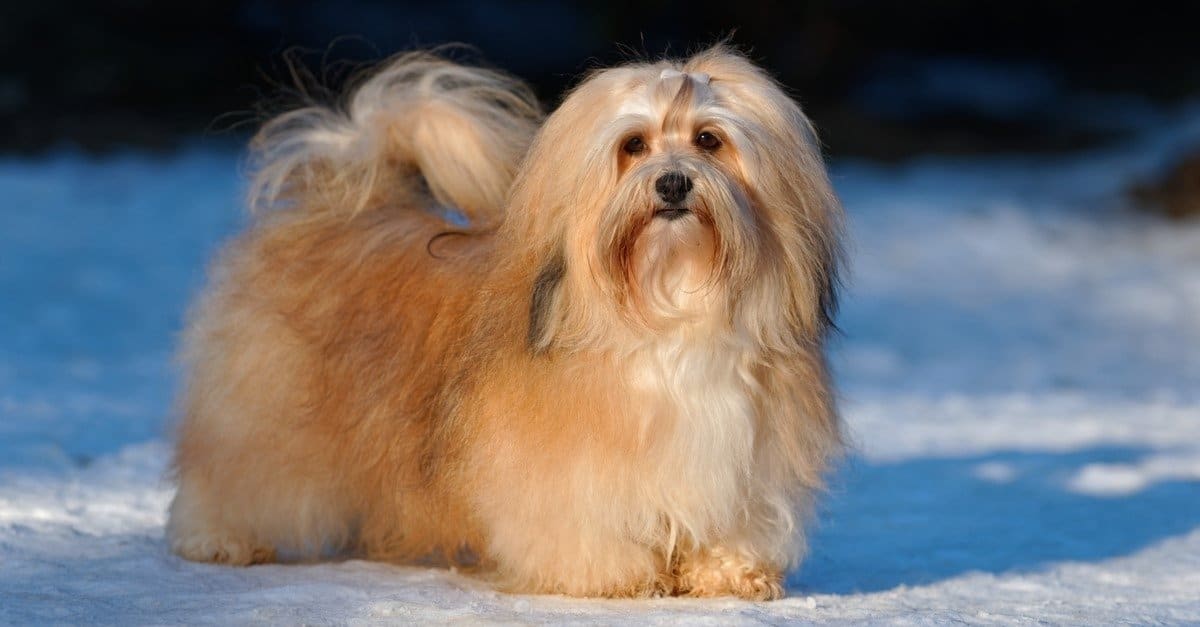For those who suffer from allergies, finding a dog that doesn’t trigger sneezing, itching, and other symptoms can be a challenge. One breed that is often touted as hypoallergenic is the Havanese, but how accurate is this claim? In this article, we’ll explore the question of whether Havanese dogs are truly hypoallergenic or if there’s more to consider when choosing a pet for allergy sufferers. We’ll examine the reason behind pet allergies and what makes certain breeds better suited for people with sensitivities. Ultimately, we hope to provide you with a better understanding of whether or not a Havanese could be the right fit for their home.
About Havanese Dogs
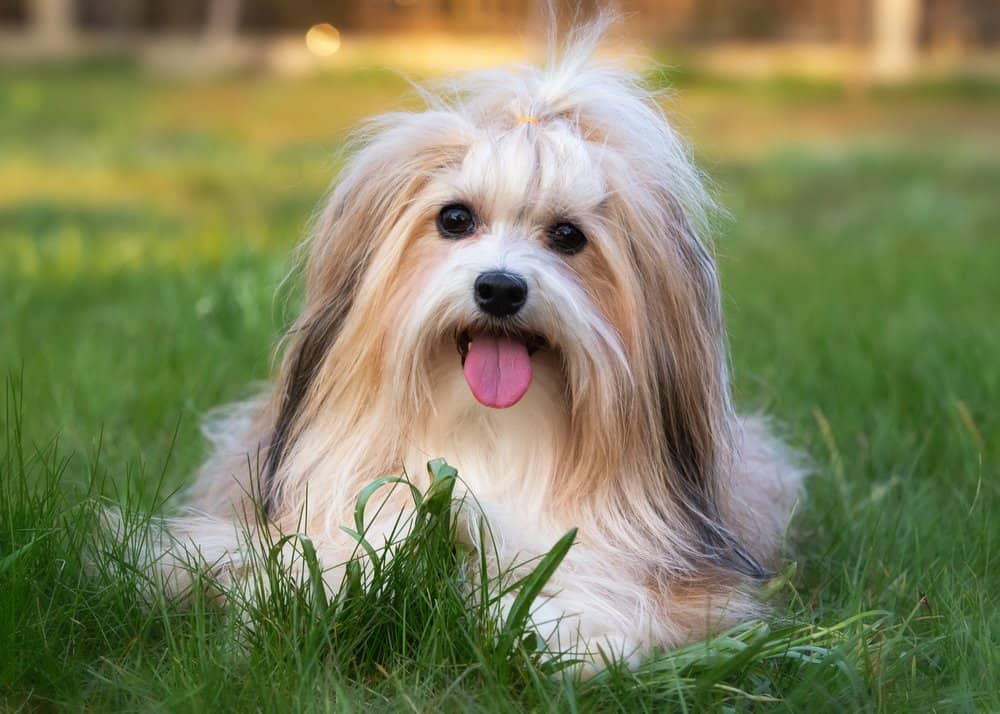
Havanese dogs are hypoallergenic.
©Sandra Huber/Shutterstock.com
The Havanese breed is known for its affectionate and playful personality. People lovingly call them “velcro dogs” because they love to be near their owners at all times and crave attention. Havanese dogs are also intelligent and trainable, making them great companions for families with children or other pets.
In addition to being friendly and outgoing, Havanese dogs are typically adaptable to different living situations. Whether you live in a small apartment or a large house with a yard, these pups can thrive as long as they receive proper exercise and socialization.
Overall, if you’re looking for a loving and loyal companion who will bring joy into your life, consider adding a Havanese dog to your family!
Are Havanese Hypoallergenic?
If you suffer from allergies but still want to bring a furry friend into your home, the Havanese breed may be an excellent choice. While no dog can guarantee complete hypoallergenic properties, the Havanese is one of several breeds that are less likely than others to trigger allergic reactions. So yes, Havanese are hypoallergenic dogs.
There are two primary reasons for this. Firstly, the Havanese have notably fewer dander particles in their fur and skin cells than many other breeds do. Dander is dead skin cells that flake off of animals’ bodies and can cause allergic reactions in sensitive individuals. The reduced amount of dander produced by Havanese dogs means they are less likely to disperse these allergens throughout your home’s air.
Secondly, while fur itself is not inherently allergenic, it can carry other allergens like pollen or dust that can exacerbate allergy symptoms when distributed through shedding hair. Fortunately, Havanese dogs shed much less frequently than some other breeds do, which significantly reduces the number of potential allergens being spread around your living space.
While choosing a hypoallergenic breed doesn’t guarantee you’ll never experience an allergic reaction from pet ownership again – there is simply no such thing as a completely hypoallergenic animal – opting for a breed with fewer known triggers like the Havanese could help reduce your sensitivity over time and make enjoying life with pets possible once more!
Havanese Grooming
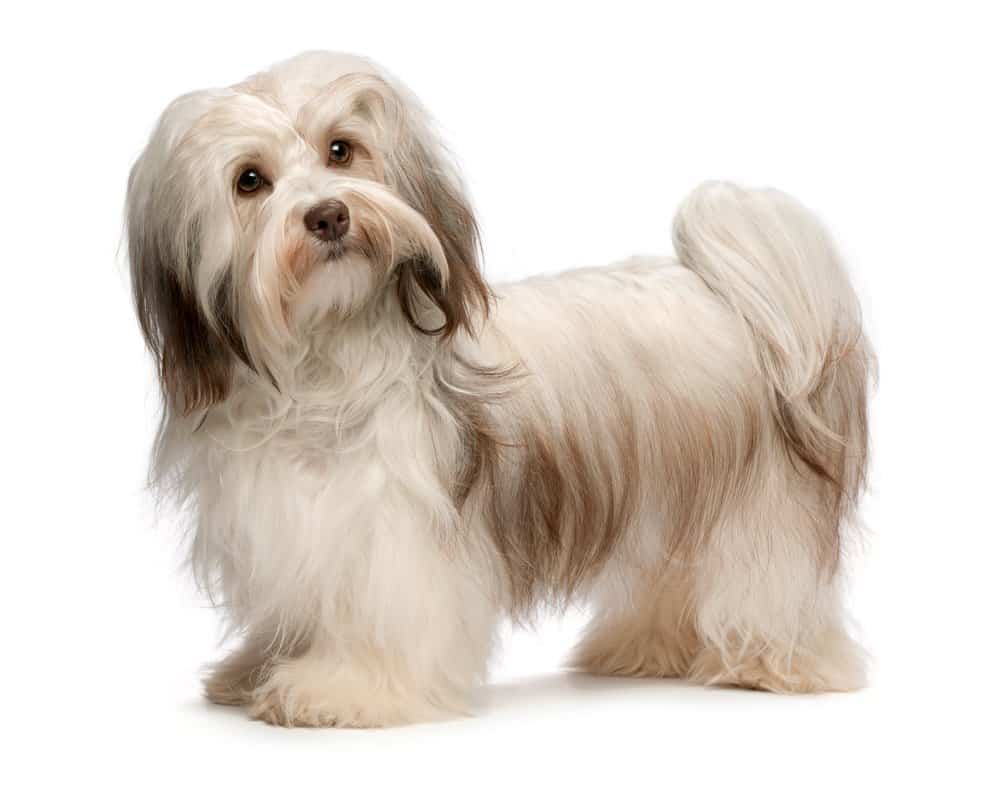
Havanese are intelligent dogs that are a joy to train.
©Dorottya Mathe/Shutterstock.com
For Havanese owners, grooming is an essential part of maintaining their dog’s long, soft, and silky coat. Daily grooming is necessary to prevent mats and tangles from forming in the fur. Running a comb or soft brush over the dog while he is on your lap can help keep his coat free from knots. However, some pet owners choose to have their Havanese clipped to a short trim to reduce overall grooming time.
You should also give your dog a bath occasionally as needed for hygiene purposes. It’s important not to bathe them too often as it can strip the natural oils that protect their skin.
In addition to regular brushing and bathing, pay attention to specific areas, such as the corners of the eyes, where tear stains commonly occur due to lighter-colored hair in those areas. Cleaning these spots daily with gentle products can help prevent staining.
Checking the ears frequently for excess wax or debris buildup is also crucial for Havanese maintenance. Wiping out the inside of the ear flap with slightly moistened gauze or a paper towel can keep them clean and healthy.
Overall, proper grooming practices are vital in ensuring that a Havanese looks great and stays comfortable.
Havanese Exercise
The Havanese breed has moderate exercise requirements. While they do not need intense physical activity, they do require regular exercise to maintain their health and happiness. A brisk daily walk or a fun playtime in the backyard with their owner can provide them with enough stimulation and exercise. These dogs are social creatures that thrive on human companionship, so it is important for owners to spend quality time interacting with them.
Additionally, romping inside the home can also offer sufficient activity for these small dogs. However, it is crucial not to over-exercise a Havanese of any age, as this could lead to exhaustion and potential injury. If an owner notices panting or struggling during an exercise session, it’s best to take a break and head back home.
While Havanese can adapt well to different living situations, such as houses or apartments, they do require attention from their owners. Leaving them alone for extended periods of time may lead to separation anxiety or destructive behavior due to boredom.
In summary, providing adequate but moderate exercise while spending quality time with your Havanese will help keep them happy and healthy throughout all stages of life.
Havanese Training
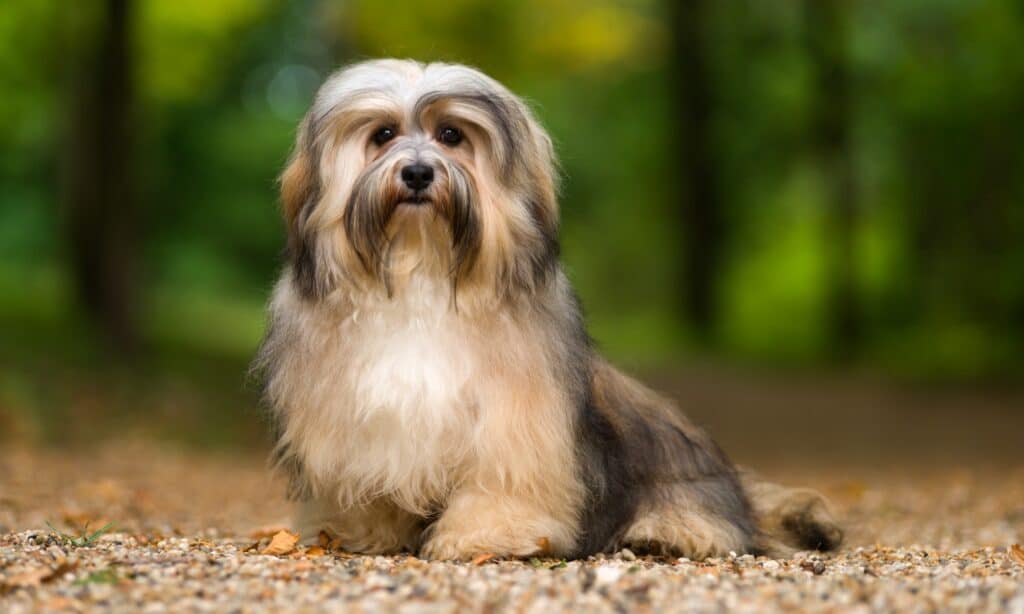
Havanese shed very little and are one of the more hypoallergenic dogs out there.
©iStock.com/Dorottya_Mathe
As a highly intelligent and eager-to-please breed, Havanese are relatively easy to train using positive reinforcement techniques. However, it is crucial that owners avoid scolding or punishing this sensitive breed too harshly. Instead, use gentle and patient training methods so the dog’s confidence is not damaged.
Socialization from an early age is also essential for Havanese dogs. Exposing them calmly to new places and people helps them develop into well-adjusted adult dogs who are comfortable in different environments. It is important to make sure these experiences are positive rather than intimidating so that they do not become fearful or anxious around unfamiliar situations.
Despite their sensitivity, Havanese are affectionate with people and get along well with other non-aggressive pets. With proper training and socialization, they can make wonderful companion animals for households of all kinds.
Havanese Diet
When it comes to the Havanese diet, it is important to ensure that you provide high-quality dog food that is appropriate for their age. Whether your Havanese is a puppy, an adult, or a senior, you must provide them with the necessary nutrients and vitamins required by their body.
It should be noted that some Havanese dogs can easily gain too much weight if they consume more calories than what their body requires. Therefore, monitoring your dog’s calorie consumption and weight level is crucial in keeping them healthy.
While treats can be an excellent aid in training your furry friend, giving too many of them can lead to obesity. Give treats in moderation while also considering the number of calories these snacks contain.
Table scraps should only be given sparingly or avoided altogether since human foods may not always agree with our pets’ digestive systems. Also, never give cooked bones and foods with high-fat content, as they pose serious health risks such as choking hazards or pancreatitis.
As a responsible pet owner, familiarizing yourself with which human foods are safe for dogs and those which are harmful will help prevent unwanted health complications from arising due to incorrect feeding practices.
History of the Havanese Breed
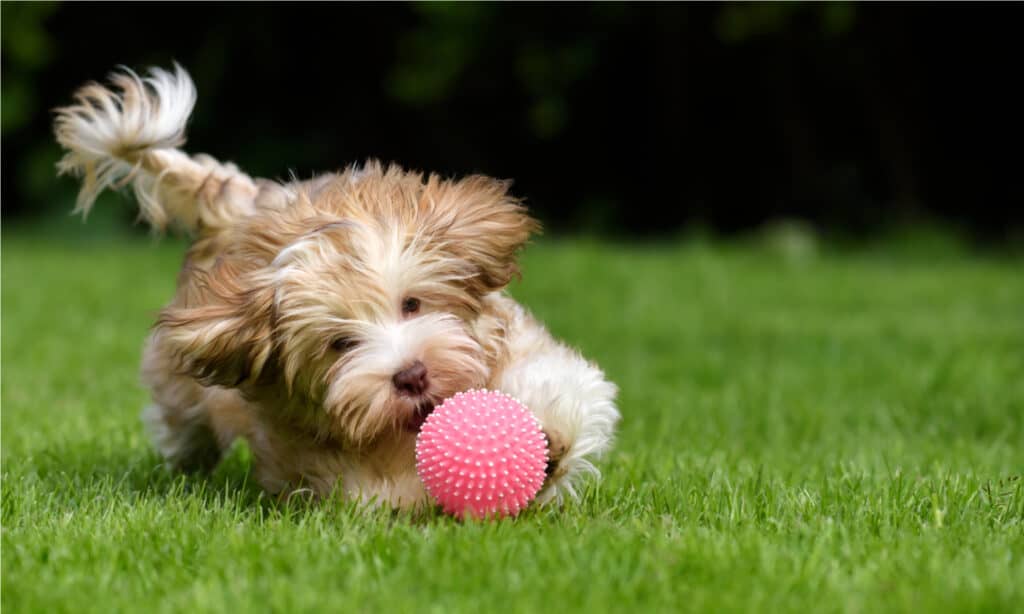
Start training your Havanese puppy early. They learn very fast!
©Dorottya Mathe/Shutterstock.com
The Havanese breed has a rich history that dates back to the 1600s. Some people believe that Italian sea captains brought small, affectionate lapdogs to Cuba’s wealthy aristocrats during their travels. Some sources attribute the breed’s origin to Spanish colonists who also brought similar breeds like Bichon Frise and Maltese with them.
For about three centuries, the Havanese breed was known as the Havana Silk Dog. Cuban’s high-society and elite class highly valued these dogs. They loved their playful personalities and charming looks. However, after Fidel Castro’s Communist takeover of Cuba in 1959, many Cuban citizens left for America along with their beloved pets.
Since then, American enthusiasts have worked hard to promote this unique breed worldwide. Today, Havanese dogs are popular among pet owners everywhere because of their adorable appearance and friendly nature.
Interestingly enough, Ernest Hemingway and Charles Dickens both had a fondness for Havanese dogs; Hemingway developed his love for the breed while living in Cuba for two decades, while Dickens owned a small dog named Tim over a century ago.
In conclusion, despite its humble beginnings as a luxurious item traded by merchants traveling across different parts of the world hundreds of years ago – today, this adorable little canine companion has earned global popularity due to its endearing traits such as being hypoallergenic which makes it an ideal choice for people with allergies or sensitivities!
.
Ready to discover the top 10 cutest dog breeds in the entire world?
How about the fastest dogs, the largest dogs and those that are -- quite frankly -- just the kindest dogs on the planet? Each day, AZ Animals sends out lists just like this to our thousands of email subscribers. And the best part? It's FREE. Join today by entering your email below.
Thank you for reading! Have some feedback for us? Contact the AZ Animals editorial team.

